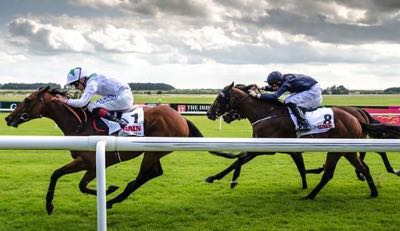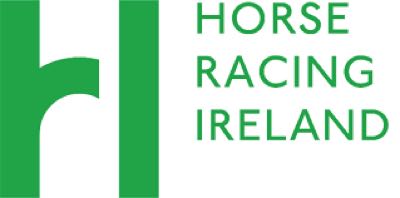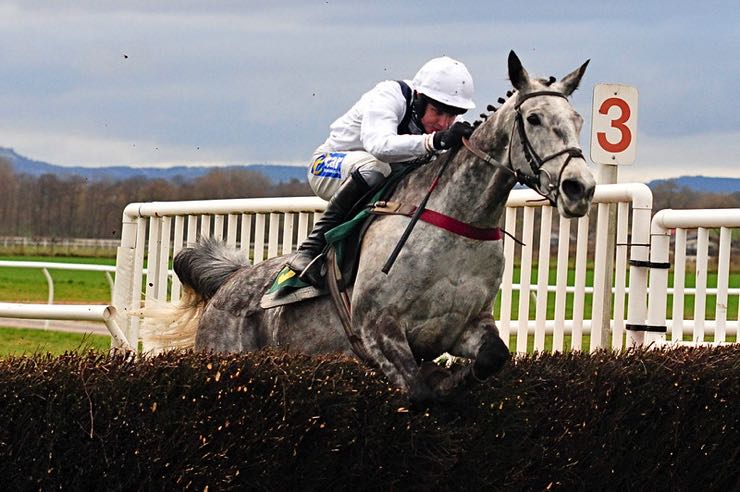
There are few, if any, nationalities in the world who love their racing quite so much as the Irish. Nor are there many countries who boast so rich a racing heritage. The birthplace of steeplechasing in the 18th century – when the contests were quite literally races between two church steeples – the first recorded Irish race meeting took place on the beach at Laytown way back in 1868, and the sport has gone from strength to strength ever since. A trip to the races on the other side of the Irish Sea is not to be forgotten (even if the Guinness might make it impossible to remember too!).
Now one of the most popular spectator sports in the country, and responsible for the employment of over 14,000 people, the €1billion Irish racing industry is also a major player on the global stage. Particularly influential in the breeding world – thanks in no small part to super-sire, Galileo – Irish racing has given us many of the greatest horses, trainers and jockeys in the history of both flat and National hunt racing, and looks set to do so for some time to come.
In this feature, we will give a brief overview of horse racing in Ireland, looking at how it is organised, who is responsible for what and explaining the key classifications for the various races.
Irish Racing Organisation
 Boasting close ties with British racing, the sport in Ireland is organised in a very similar manner, both in the flat and National Hunt spheres. As in Britain, an official rating system is in place, whereby every horse in training is assigned a rating to reflect their ability. The job of horse assessment and ratings compilation is assigned to the official handicappers employed by the Irish Horse Racing Board, just as in Britain this task is undertaken by the handicappers of the British Horseracing Authority.
Boasting close ties with British racing, the sport in Ireland is organised in a very similar manner, both in the flat and National Hunt spheres. As in Britain, an official rating system is in place, whereby every horse in training is assigned a rating to reflect their ability. The job of horse assessment and ratings compilation is assigned to the official handicappers employed by the Irish Horse Racing Board, just as in Britain this task is undertaken by the handicappers of the British Horseracing Authority.
The main purposes of this rating system are to provide an effective ranking system, and to enable the framing of weights to be carried in handicap contests. In common with the majority of ratings systems used in racing around the world, one ratings point equates to one pound in weight, so that in a handicap event, an 85-rated runner would be required to carry 5lbs more than an 80-rated performer. The goal of this system is to at least theoretically even the playing field, and so create highly competitive action between horses of differing natural abilities.
So, the basis for the ranking of horses and the framing of races is the same in both Britain and Ireland, and there are also many similarities in terms of the classification system, and the types of races run in each jurisdiction.
There are however also a few differences – mainly in terms of the labelling and grading of certain types of race. Here, we outline the flat and National Hunt race types and classifications, in the country which boasts more horses per head than any other European nation (now there’s a fact for you!).
Irish Flat Racing Classifications

The main Irish flat season runs from mid-March to November each year, taking place at 22 turf venues and the country’s only all-weather track at Dundalk. In terms of race classifications, the Irish system ties in closely with that which is used in Britain, with the main differences coming in the ranking of handicap races.
Group 1
The top tier of the sport includes prestigious contests, such as the five Classics of the Irish Derby, Irish Oaks, Irish 1000 Guineas, Irish 2000 Guineas and Irish St. Leger (once again you can see an obvious similarity with UK racing).
Group 1 races are run under what are known as “weight for age” conditions, whereby all runners carry the same weight, with the exception of allowances relating to the age and sex of the horses – four year olds and above carry more than the younger horses, and male horses carry more than females in order even out strength differences. In order to be assigned Group 1 status, the three-year average rating of the first four finishers in any given race must be at least 115.
Group 2
A notch below Group 1 level, Group 2 events are nevertheless still deemed to be contests of real international significance, and in Ireland include the highly influential two year old races of the Railway Stakes, Futurity Stakes and Beresford Stakes. Group 2 events are run under the same weight for age conditions as the Group 1s, with the addition of further weight penalties for runners who have previously won at Group 1 or Group 2 level. In order to be assigned Group 2 status, the three-year average of the first four finishers must be 105 for two year old contests, and 110 in races for older runners.
Group 3
As you might have guessed, next comes Group 3 races. Just below Group 2 level, these weight for age events tend to be of greater importance at national level rather than on an international scale. The three year average of the first four finishers is again used to determine Group 3 status, with the benchmark values in this case being 100 for two year old races and 105 for the contests for runners aged three and older.
Listed
Next on the Irish horse racing ladder come the Listed contests. These are once again weight for age events, with penalties in place for previous wins at a specified level. Not quite up to Group race standard, Listed events still rated higher than even quality handicap races, and generally attract runners rated 90 and above.
Conditions
As the title suggests, this category will set certain conditions for entry. Examples include events for previous winners of races of a specified value, or horses to have already won twice. Conditions contests tend to be weight for age events with penalties in place.
Handicap
Next come the handicaps, which as a group of races make up the bulk of the Irish racing programme. The weights to be carried by the runners in handicap events are determined by the ratings assigned by the official handicapper. Unlike in Britain – where handicaps are ranked using a class system (Class 1 down to Class 7) – in Ireland such events are labelled according to the ratings of the runners permitted to enter.
The most valuable handicaps on the programme are labelled “Premier Handicaps”, with the rest simply including a ratings band in their title. For example you might consider the Craic At The Track This Weekend Handicap (45-65) which took place at Dundalk on 13th March 2020, and was open to runners rated between 45-65. There are many ratings bands used in Irish racing, but some of the most common are as follows:
- 45-65
- 47-60
- 50-70
- 50-80
- 60-80
- 60-90
- 60-100
- 70-100
Nursery Handicap
This is simply any handicap race that is restricted to two year old runners.
Maiden
As in the UK, this is the starting point for racehorses. These races are restricted to runners who have never previously won a race. Runners must either win a maiden race, or run in three such events in order to be assigned a handicap rating. Maiden races are usually restricted to a specific age group, e.g. 2-Y-O Maiden, or 3-Y-O Maiden.
Auction Maiden
A maiden contest limited to runners who have been sold at public auction for an amount at or below a specific value.
Median Auction Maiden
A maiden restricted according to the median value of a stallion’s yearlings. Only runners sired by a stallion who has had two or more yearlings sold at public auction – for a median value at or below a specified amount – are permitted to enter.
Claiming Race
A race in which a runner can be sold following the contest. The price of each horse is specified before the race takes place, with the weights carried by each runner then being linked to this price – the higher the specified price, the more weight to be carried.
Selling Race
A race after which the winner is offered for sale at public auction.
Apprentice Race
Things start to get a little more self-explanatory now and this is a contest that is restricted to apprentice jockeys. When competing against professional jockeys, apprentice riders will receive a weight allowance which varies according to the previous success of the apprentice. No such allowances are applied in an Apprentice Race.
Amateur Race
Once again, does what it says on the tin – a race that is restricted to amateur jockeys.
Ladies Race
You guessed it: contests for female riders only.
Irish National Hunt Racing Classifications

Made up of hurdle contests featuring obstacles of 3ft1 in height; steeplechases offering a more substantial jumping challenge, and Bumper (flat) races for beginners, National Hunt racing has deep roots in Ireland and remains hugely popular to this day.
In line with Britain, the bulk of the Irish National Hunt season is held on the softer ground between November and the end of April, and takes place across the country’s 23 jumping venues. The classification system has much in common with that used in Britain, with the main differences again coming in the categorisation of handicap races.
Grade 1
The highest class and amongst the most valuable races of the season. Grade 1s are run under weight for age conditions, with the only weight penalties being related to the age or sex of the runners. Prestigious contests such as the Irish Champion Hurdle, Irish Gold Cup and Punchestown Gold Cup, equivalent to some of Cheltenham’s biggest races, fall into this category.
Grade 2
These are run under the same conditions as Grade 1 races, with the addition of penalties for previous wins in certain contests. Grade 2s are of a slightly lower quality and value than Grade 1s, but nevertheless attract a very high standard of horse and typically feature at bigger meetings.
Grade 3
Next on the list, and a little further down the quality ladder, come the Grade 3 events. In the UK this category is dominated by quality handicap races, but in Ireland all Grade 3s are run as weight for age affairs.
Listed
Just below Graded class, these weight for age contests still tend to be of domestic significance.
Handicap Hurdle/Chase
A hurdle or chase contest in which the weights carried are determined by the official ratings of the runners. The top three levels of handicap are classified as “Grade A”, “Grade B”, and “Grade C”, with those lower down the ladder being bracketed by the ratings of runners permitted to take part – in much the same manner as used on the flat.
Novice Hurdle/Chase
A race for runners who have not won a hurdle or chase prior to the start of the current season. Run under weight for age conditions.
Beginners Chase
Similar to a novice chase, in that runners must not have won a chase prior to the start of the current season. However, whereas a winner of a novice race would then still be eligible to run in another such event within the same season, a winner of a beginners’ race would not be permitted to take part in another beginners’ race – or if the specific conditions dictate that they can line up, they would be required to carry a weight penalty.
Novice Handicap
A novice hurdle or chase run under handicap, rather than weight for age, conditions.
Maiden Hurdle/Chase
In order to compete runners must not have previously won a hurdle or chase, but they may have won a bumper.
Conditions Race
Races which have specific criteria relating to conditions of entry. These conditions may concern the number, or value of races previously won. Usually run as weight for age contests with penalties in place for previous wins.
Juvenile Hurdle
A hurdle contest restricted to four year old runners.
Hunter Chase
A race for horses who have also been used for the purpose of hunting in the current racing year. Hunter Chases feature only amateur jockeys and are run under weight for age conditions.
Conditional Jockeys Race
As the name indicates, a race restricted to conditional jockeys. The equivalent of apprentice jockey races on the flat, which is to say riders who are still learning their trade and have not yet entered the fully professional ranks.
Amateur Race
A race restricted to amateur riders.
Claiming Race
As with the flat, these are races in which the winner is then able to be purchased for a price specified in advance of the race. The runners carry weights related to these prices – the higher the price, the greater the amount of weight carried.
Selling Hurdle/Chase
These are generally lower class races after which the winner is offered for public sale.
National Hunt Flat Race
Also known as bumpers, these events are open to National Hunt horses but do not feature any obstacles. Usually used as an introduction to the racecourse for runners who subsequently compete in hurdles and/or chases.